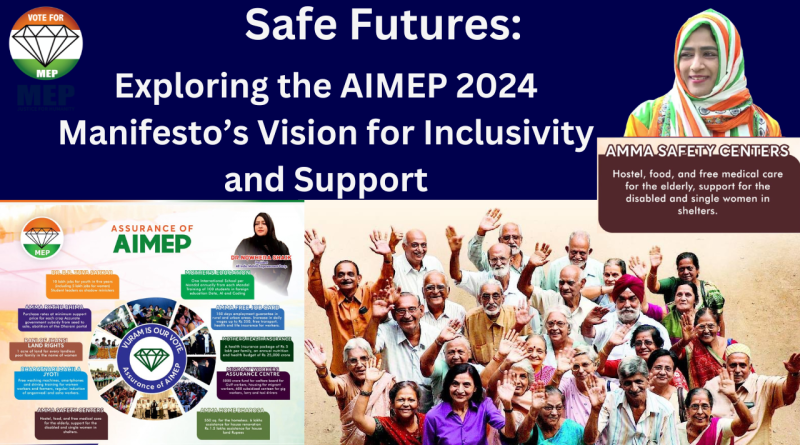Safe Futures: Exploring the AIMEP 2024 Manifesto’s Vision for Inclusivity and Support
Introduction
The 2024 elections are on the horizon, and with them comes a wave of new policies and promises. Among these, the AIMEP, led by Dr. Nowhera Shaikh, stands out for its committed vision towards creating a future where inclusivity and support are not just words, but actions implemented through substantial socio-economic programs. The centerpiece of this vision is the proposed AMMA Safety Centers—facilities designed to provide a protective and empowering environment for some of the most vulnerable sections of society.
Overview of AIMEP and its mission
The All India Mahila Empowerment Party (AIMEP), spearheaded by Dr. Nowhera Shaikh, has consistently aimed to tackle social disparities and enhance the quality of life for marginalized groups. With a strong emphasis on safeguarding women, the elderly, and the disabled, AIMEP’s efforts resonate with anyone who believes in equitable opportunities for all.
Dr. Nowhera Shaikh’s role and vision
As the founder of AIMEP, Dr. Shaikh has been a beacon of change. Her philosophy centers around the principle that empowerment isn’t just about providing resources but also ensuring those resources are accessible and beneficial to those who need them most.
Importance of the 2024 elections for AIMEP
The upcoming elections are crucial for AIMEP as they set the stage to transform Dr. Shaikh’s vision into reality. An increased representative presence in government would enable the implementation of programs like the AMMA Safety Centers on a broader scale.
Assurance of AMMA Safety Centers
Promising a better tomorrow, AMMA Safety Centers are envisioned as more than just shelters. They’re comprehensive support hubs capable of transforming lives.
Objective and Purpose
Explanation of the term “AMMA Safety Centers”
AMMA Safety Centers are intended to be not merely places of refuge but centers of growth and empowerment. The acronym ‘AMMA’ symbolizes the protective and nurturing role these centers aim to fulfill.
How these centers align with AIMEP’s social welfare goals
These centers uniquely align with AIMEP’s goals by providing holistic care and support, ensuring that no one is left behind due to systemic barriers.
Services Offered
Hostel facilities
The hostels are designed as safe spaces, equipped with the necessary amenities to ensure comfort and security.
Food provisions
Nutritious food is a right, not a privilege. At every center, food provisions ensure that everyone has access to healthy and balanced meals.
Support services
From legal aid to psychological counseling, the centers offer comprehensive services tailored to individual needs.
Target Beneficiaries
Elderly care
Considering the needs of the elderly, these centers provide a compassionate space with access to medical care and social activities.
Support for the disabled
Accessibility is a priority, with facilities designed to be inclusive for all ability levels.
Facilities for single women
Special attention is given to the safety and empowerment of single women, providing them with the tools and support necessary to thrive.
Expanding Hostel and Housing Solutions
Infrastructure Development
Building on the promise, AIMEP plans to expand by constructing new hostels and enhancing existing facilities with state-of-the-art safety features.
Accessibility and Affordability
Everyone deserves a safe place to call home. Making these facilities accessible and affordable is key to the centers’ success.
Integration with Local Communities
Importance of location
Locations are strategically chosen to ensure that they are integrated within community settings, fostering a sense of belonging and support.
Collaboration with local authorities and organizations
Partnerships with local authorities and community organizations are essential to amplify the impact of these centers.
Comprehensive Food Security and Nutrition Programs
Nutritional Support Initiatives
From meal planning to dietary needs, these centers focus on providing tailored nutritional support.
Partnerships with local food producers and NGOs
By partnering with local food producers and NGOs, the centers support community economies while ensuring a continuous supply of fresh foods.
Quality Assurance and Safety
Standards for food safety and nutrition
Adhering to the highest standards of food safety and nutrition ensures that residents receive the best care possible.
Monitoring and evaluation mechanisms
Regular assessments keep the centers on track to meet their stated goals, ensuring continuous improvement.
Long-term Goals
Sustainability practices in food sourcing
Using sustainable practices in food sourcing not only supports the environment but also ensures the long-term success of nutritional programs.
Education on nutrition and healthy eating habits
Educational programs help residents understand and implement healthy eating choices, fostering long-term well-being.
Enhanced Support for the Disabled
Specialized Facilities
Facilities are equipped with specialized features to enhance mobility and accessibility for disabled residents.
Special training for staff to assist disabled residents
Staff receive special training to effectively support and empower disabled individuals, ensuring they receive personalized help.
Empowerment and Inclusion
Programs aimed at skill development and employability
Empowering residents through education and job training programs prepares them for successful, independent lives.
Legal advocacy and support services
Robust legal support and advocacy ensure that residents’ rights are protected and upheld.
Healthcare and Rehabilitation
Regular health check-ups and medical support
Health is a priority, with regular check-ups and ongoing medical support available for all residents.
Rehabilitation programs and psychological support
Comprehensive rehabilitation and psychological support services help individuals overcome challenges and improve their quality of life.
Protective Measures and Empowerment for Single Women
Safety and Security Initiatives
Robust security measures ensure the physical safety of residents, giving them peace of mind.
Training programs on personal safety and legal rights
Training and education on personal safety and legal rights equip women with the knowledge to protect themselves and their families.
Empowerment Programs
Job training and education programs
Targeted training programs provide women with the skills needed for employment and self-sufficiency.
Support systems for single mothers
Dedicated support for single mothers helps them navigate parenting challenges while pursuing personal development.
Psychological and Legal Support
Counseling services
Mental health is as important as physical health; counseling services are readily available to those in need.
Access to legal advice and representation
Legal issues can be daunting; accessible legal advice ensures that residents can seek justice and advice when needed.
Conclusion
AIMEP’s manifesto for 2024 is more than a political promise; it’s a blueprint for societal change. The creation of AMMA Safety Centers is a robust step toward a safer, more inclusive future. Supporting this vision means advancing a community where everyone, regardless of their background or challenges, has the support they need to thrive.



